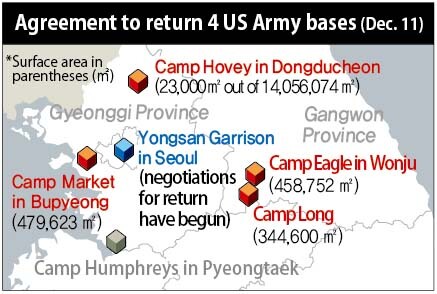hankyoreh
Links to other country sites 다른 나라 사이트 링크
[Editorial] It’s the US’ responsibility to clean up contamination at its bases

On Dec. 11, the South Korean government agreed to immediately take over four American bases in Wonju, Bupyeong, and Dongducheon and to initiate deliberations with the US about resuming control of the Yongsan Garrison. The handover of these four bases leaves 22 American bases that still remain to be returned. While we welcome the return of these bases to Korean control, it’s regrettable that Koreans have essentially been saddled with the cost of cleaning up environmental contamination on those bases. The US forces need to take responsibility for that under the polluter pays principle.
The South Korean government explained that it agreed to take over the bases, as well as the 110 billion won (US$92.64 million) decontamination bill, because of strong lobbying for speeding up the handover by those living near the bases. While the bases were closed between 8 and 10 years ago, the handover has been repeatedly delayed because of a disagreement about who should be responsible for cleaning up the pollution there.
As a result, Seoul explained, there have been continuing complaints about the possibility of pollution spilling out of the bases and about the obstacles presented to development plans, along with the resulting economic and social problems. According to this argument, these circumstances left the government with no choice but to cover the cost of decontamination in order to hurry up the handover. While the government claims that it will keep deliberating with the Americans about the issue of responsibility for decontamination, that sounds mostly like political spin.
Environmental contamination on American military bases has long been a vexed issue. While major contamination was found on the 24 American bases previously returned, stirring up a major controversy, the US military has never accepted responsibility for cleaning it up. The US admits that the bases are contaminated, but it excuses itself based on the KISE principle — namely, that it only cleans up what constitutes a “known, imminent, substantial endangerment to human health.” This determination to duck responsibility in one way or another can only be seen as mean-spirited.
To take the case of Camp Market, in Bupyeong, one of the bases being handed over, a government survey in 2017 found that carcinogenic dioxins exceeded the permissible level of 1,000 picograms in soil samples in seven of 33 sites, with the highest concentration levels being more than 10 times that. For the US to nonetheless refuse to assume responsibility can only be seen as high-handed and self-serving exploitation of South Korea’s dependence on the US military for a substantial portion of its security.
It’s common courtesy nowadays to leave nature as you found it after going on a hike or a swim in the countryside. It goes without saying that a country about to return a military base ought to clean up any contamination produced during its stay there, under the polluter pays principle. It’s time for the US to wake up.
Please direct comments or questions to [english@hani.co.kr]

Editorial・opinion
![[Column] Life on our Trisolaris [Column] Life on our Trisolaris](https://flexible.img.hani.co.kr/flexible/normal/500/300/imgdb/original/2024/0505/4817148682278544.jpg) [Column] Life on our Trisolaris
[Column] Life on our Trisolaris![[Editorial] Penalties for airing allegations against Korea’s first lady endanger free press [Editorial] Penalties for airing allegations against Korea’s first lady endanger free press](https://flexible.img.hani.co.kr/flexible/normal/500/300/imgdb/original/2024/0502/1817146398095106.jpg) [Editorial] Penalties for airing allegations against Korea’s first lady endanger free press
[Editorial] Penalties for airing allegations against Korea’s first lady endanger free press- [Editorial] Yoon must halt procurement of SM-3 interceptor missiles
- [Guest essay] Maybe Korea’s rapid population decline is an opportunity, not a crisis
- [Column] Can Yoon steer diplomacy with Russia, China back on track?
- [Column] Season 2 of special prosecutor probe may be coming to Korea soon
- [Column] Park Geun-hye déjà vu in Yoon Suk-yeol
- [Editorial] New weight of N. Korea’s nuclear threats makes dialogue all the more urgent
- [Guest essay] The real reason Korea’s new right wants to dub Rhee a founding father
- [Column] ‘Choson’: Is it time we start referring to N. Korea in its own terms?
Most viewed articles
- 160% of young Koreans see no need to have kids after marriage
- 2[Reporter’s notebook] In Min’s world, she’s the artist — and NewJeans is her art
- 3Hybe-Ador dispute shines light on pervasive issues behind K-pop’s tidy facade
- 4[Column] Life on our Trisolaris
- 5[Editorial] Penalties for airing allegations against Korea’s first lady endanger free press
- 6Presidential office warns of veto in response to opposition passing special counsel probe act
- 7S. Korea discusses participation in defense development with AUKUS alliance
- 8Vietnamese war victims speak of sexual violence by S. Korean troops for the first time
- 9Months and months of overdue wages are pushing migrant workers in Korea into debt
- 10Inside the law for a special counsel probe over a Korean Marine’s death